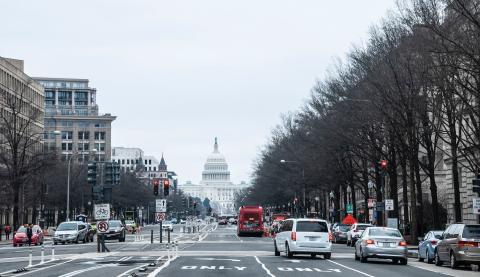Photo Credit: Maria Oswalt on Unsplash
Open primaries and ranked choice voting could be the future of elections in Washington, DC. The city’s Board of Elections unanimously ruled that a proposed measure that would adopt both reforms can be placed on the city’s 2024 ballot.
Now, it is up to the Make All Votes Count DC campaign to collect the 26,000 signatures needed to make it happen.
“I am sincerely grateful to the DC Board of Elections for conducting its due diligence and making the proper subject matter determination for my proposal to reform DC’s elections to be more inclusive of independent voters currently disenfranchised,” said Lisa Rice, who proposed the ballot initiative.
Rice is also an advisory neighborhood commissioner in the city’s 7th ward.
The Make All Votes Count DC initiative, which is now officially known as Ballot Initiative #83, would do two things in particular:
- It would allow independent voters an opportunity to choose a party ballot in the primary (a semi-open partisan primary). The city currently conducts a closed primary in which only party members can participate in these taxpayer-funded elections.
- It would adopt ranked choice voting for ALL DC elections.
“It’s really important, especially open primaries, to bring this to the voters,” said Rice. “Those are taxpayer-funded primaries. And so, as a taxpayer, I would like to vote in the primaries, because they matter.”
Ballot Initiative #83 follows failed legislation that was introduced in the DC City Council in 2021. The legislation, which proposed ranked choice voting (RCV) for city elections, never advanced to a council vote due in part to opposition from the city’s Democratic Party
The party’s arguments echoed the same talking points used by Republican leaders in Maine and those made by some Democratic leaders in NYC – namely, RCV is too complicated for voters to understand and would exacerbate problems like undervoting.
An undervote occurs when a voter selects fewer candidates on the ballot than the election allows. In the case of a single-choice election, an undervote would occur when a voter selects no candidates.
In an RCV election, it would occur when a voter doesn't rank the candidates on the ballot or ranks fewer candidates than they are allowed to rank.
Make All Votes Count DC points to research from FairVote that shows how natural and easy to understand ranking candidates is for voters. They also point to additional research that finds that RCV has elected more women and people of color and reduces toxicity and negativity in campaigns.
Democratic leaders also oppose open primaries, pointing to the fact that they would make elections less partisan. “Open primaries would undermine the partisan nature of elections and dilute the voices of members of the party,” said DC Democratic Party Chair Charles Wilson.
Make All Votes Count DC states that open primaries would give 16% of registered voters who are currently barred from participating in taxpayer-funded primary elections in the city an opportunity to express their candidate preferences in the most critical stage of the election process.
“I believe the much-needed electoral reforms outlined in the Make All Votes Count Act of 2024 will have a positive impact on the governance of the District of Columbia and we look forward to engaging and educating voters in the coming months,” said Rice.
It is unclear as of now how the Democratic Party will respond now that the DC Board of Elections has determined that Ballot Initiative #83 clears all legal requirements to appear on the city’s ballot. Party officials could try to appeal the decision to the DC Supreme Court.
The DC Board of Elections now has less than 20 days to finalize the short title, summary text, and language of Ballot Initiative #83 while Make All Votes Count DC prepares for the signature gathering process.
